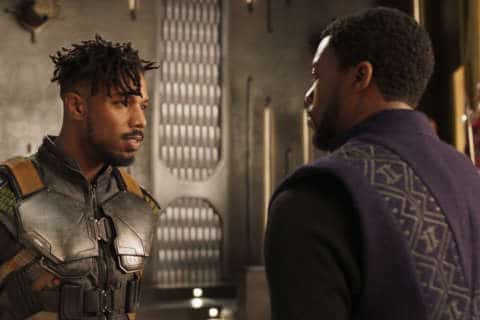WASHINGTON — “Black Panther,” the latest blockbuster offering from the Marvel Cinematic Universe, promised us a kick-ass superhero movie that would show us how the main character, T’Challa, takes over the mantle of Black Panther from his father, T’Chaka.
What we got was something so much more.
This is one of the few instances in which a movie surpassed the hype. I’m no film critic, so I’ll leave the judgment of the movie’s cinema chops to the review from WTOP’s Jason Fraley. But I know a good story when I see one, and I can definitely identify with the cultural significance of seeing the first superhero movie co-written and directed by black wunderkind Ryan Coogler and starring a predominantly black cast.
It’s not so much that this movie exists — it’s how highly anticipated and well done it is. This wasn’t some made-for-TV movie on BET or destined-to-flop theatrical release like “The Meteor Man” (1993) or “Spawn” (1997). “Black Panther” is a legit blockbuster that’s been the most talked about movie for two years, set records for pre-sale tickets, and subsequently, blew away box office marks for an opening weekend. While Black America’s rally to support the film is a contributing factor, it’s one of many reasons why this movie is incomparable.
Every. Single. Theater. Is. #BlackPanther 👏🏻👏🏻👏🏻 pic.twitter.com/hrkgjE2It3
— Natalie Abrams (@NatalieAbrams) February 16, 2018
Attention must be paid to the way black people are depicted in this movie. “Black Panther” is a compelling film about a thriving African nation, not a crime-ridden city nor a slavery-era plantation that weaves in patterns of vulnerability, negative stereotypes or dependence on white benefactors.
The fictitious nation of Wakanda is one that thrives on its own natural resources and has pioneered cutting-edge science and technology. If the rest of the world knew about the ways of Wakanda (which it doesn’t, for reasons made clear in the movie), it would be the envy of the planet.
Even in the act of hiding its greatness under the guise of a third-world country, Wakanda makes a strong statement. Wakanda has actively chosen to isolate itself for the purposes of self-sustenance, and it has flourished because of it. No colonizers can come to steal your technology or rich deposits of the powerful (and fictitious) metal vibranium if they don’t know you have it. People outside their borders assume it’s a “s-hole country” because Wakanda wants them to.
While the nation of Wakanda as a whole is impressive, so too are the individual characters. Shuri, T’Challa’s sister, made quite the impression on both me and my 11-year-old daughter. Shuri isn’t just some wisecracking younger sibling there for comic relief; she’s a brilliant scientist that made extraordinary advancements in Wakandan technology that are directly responsible for the country’s continued progression.
At one point in the film, she introduces her brother to the incredible gadgets she designed to aid him in his quest to find the villainous Ulysses Klaue. The scene was reminiscent of the witty tête-à-tête between Q and James Bond in nearly all of the Bond films.
Which calls to mind another thing I loved about this movie: strong black women. While last year’s “Wonder Woman” was a groundbreaking superhero flick in its own right, Black America found it suspicious that there weren’t any Amazons of color. “Black Panther” makes up for that omission and then some: Most of the Wakandan warriors — including the top general, Okoye — are women. In fact, each female character around T’Challa is strong in her own right, and this healthy dose of feminism is dispensed in such a positive way.
The movie’s conflict didn’t get in the way of this uplifting arc. In fact, it strengthened it. The clash between T’Challa and the movie’s villain, Killmonger, isn’t some perpetuation of “black-on-black crime.” Without giving any plot twists away, their dispute is way more nuanced than that, providing us with a better story and a deeper understanding that sometimes, the true difference between good and evil is circumstance.
The subliminal power that comes from seeing these positive visuals surrounding black lives cannot be overstated. Think of the cultural significance of “The Cosby Show.” That was really the first family sitcom to focus on an affluent black family. Then came “The Fresh Prince of Bel Air.” Both shows had a broad appeal that transcended race.
As a kid growing up, I needed to see Cliff Huxtable and Philip Banks (and on a personal level, my father) do well. It told me I, too, could be a doctor, judge, high-level executive or broadcaster — and that it was totally natural for someone that looks like me to do those things. We’re not all destined to struggle.
So, looking up at an IMAX screen and seeing black scientists in a superhero movie and the African garb associated with the film on prominent display is a huge boost in morale for people of color at a time when African nations are being labeled “s-hole countries.” This is black excellence on a grand stage, taking our heritage from the disregarded periphery to a more esteemed place in the mainstream.
This might be the best #BlackPanther photo ever pic.twitter.com/dEsKYy6ppu
— yellowmello (@yellowmello) February 17, 2018
That’s what makes “Black Panther” so significant. This is a movie by black people and starring black people — but made for all people. The film’s family dynamics and the sense of loss and conflict are things that people of all creeds and colors can understand, just like everyone turned on their TVs and seemed to relate to Cliff Huxtable and Philip Banks.
Though this movie is a celebration of black excellence, its real theme is that those with great power and resources have a responsibility to use them to make the world a better place for everyone. Marvel created a timely masterpiece by focusing on a great story with a message and just a dash of over-the-top, CGI-fueled fight scenes — rather than the other way around.
And in addition to a remarkably lucrative movie franchise, Marvel has also gifted us a stunning vision of a black utopia. My hope is that this film is the harbinger for more films featuring black brilliance and not just a solitary glimpse of what could be.
Wakanda forever.








